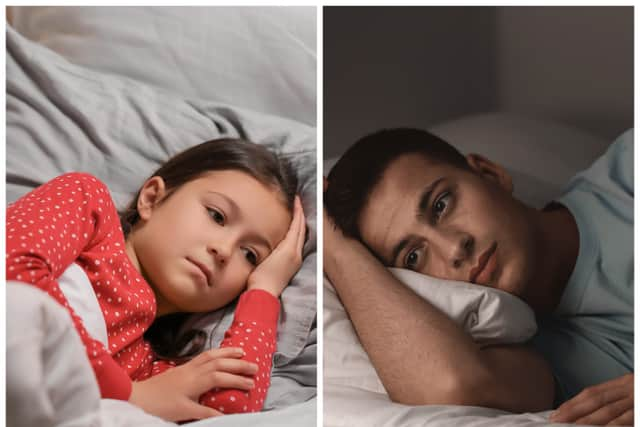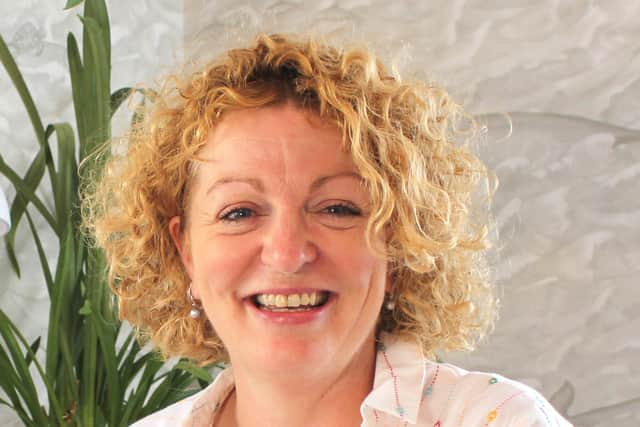Sleep disorders: 19 conditions explained including insomnia, sleep paralysis, sleep apnoea and narcolepsy
and live on Freeview channel 276
Many of us will have difficulty sleeping at some point in our lives. For most of us this is a short-lived response to a particular situation that is affecting us at that moment - it could be stress, lifestyle changes, social factors such as drinking alcohol or environmental factors such as being too hot or too cold. These issues can normally be resolved in some way and then the usual sleep pattern is restored.
But, this isn’t the case for everyone. Some people suffer from one or more of a range of parasomnias and disruptive sleep disorders. These are unusual behaviours which happen to a person when they are either falling asleep, during sleep or when they are waking up - and they not only cause the sufferer to struggle to get the sleep they need to feel well rested and refreshed, but they can also be detrimental to their mental and physical health, and could even be scary.
Advertisement
Hide AdAdvertisement
Hide AdAs it is now Sleep Awareness Week (March 12 to 18) and World Sleep Day is also approaching (17 March), we explore 19 different sleep disorders that people of all ages can suffer from, their symptoms and their possible causes with the help of sleep experts who spoke to NationalWorld. It’s important to note, however, that if you believe you may have one of these conditions you should consult your doctor. Specialist sleep psychotherapist, Heather Darwall-Smith said: “While these sleep disorders may be disruptive to a person’s sleep or cause distress, most are treatable with proper diagnosis and management by a healthcare professional.”
If you are having trouble sleeping, but you don’t think you are experiencing any of the conditions listed below then check out our expert guide with nine top tips on how to help you sleep better.
Insomnia
Insomnia is characterised by having difficulty falling asleep and also remaining asleep. According to the NHS, you have insomnia if you regularly:
- find it hard to go to sleep
- wake up several times during the night
- lie awake at night
- wake up early and cannot go back to sleep
- still feel tired after waking up
- find it hard to nap during the day even though you’re tired
- feel tired and irritable during the day
- find it difficult to concentrate during the day because you’re tired
It is thought that one third of people in the UK will have episodes of insomnia at some point of their lives, according to the NHS. If you have insomnia for less than three months it’s called short-term insomnia, but if you have had this issue for three months it is called long-term insomnia.
Advertisement
Hide AdAdvertisement
Hide AdThere are three different types of insomnia, according to Geraldine Joaquim, a clinical hypnotherapist and wellness coach specialising in sleep disorders. They are:
- Initiation insomnia – this occurs when people struggle to get to sleep and is often associated with stress.
- Maintenance insomnia – this happens when people wake up in the middle of the night, can’t get back to sleep or wake up really early. It is also often associated with stress.
- Consolidation insomnia – this is when people wake up frequently throughout the night, and is usually associated with pain or bodily changes such as going through perimenopause, or external influences like young children disrupting you.


Darwall-Smith advised that people should always speak to their doctor if they think they may have insomnia. She said: “It’s important to note that a healthcare professional should make the official diagnosis of insomnia, as they will conduct a thorough assessment to rule out other potential causes of the sleep disturbance and to determine the best course of treatment.”
Narcolepsy
Narcolepsy is a rare long-term brain condition that can prevent a person from choosing when to wake or sleep, according to the NHS. The condition means that the brain is unable to regulate sleeping and waking patterns normally, states the NHS, and this can result in several symptoms which include:
- excessive daytime sleepiness which can lead to a person feeling very drowsy during the day which also means they can then find it difficult to concentrate and stay awake.
- sleep attacks which mean people fall asleep suddenly and without warning.
- excessive dreaming and waking in the night. If people have dreams which often come as they fall asleep these are called hypnagogic hallucinations or if people have them just before or during waking they are called hypnopompic hallucinations.
Restless leg syndrome
Restless legs syndrome is a common condition of the nervous system that causes a person to have an overwhelming and irresistible urge to move their legs. It is also known as Willis-Ekbom disease. Solution focused psychotherapist Gin Lalli said: “This creeping feeling can give painful uncomfortable sensations in the lower legs which prevent relaxation and sleep”. Darwall-Smith said that sufferers “sometimes describe the feeling as ants wriggling under the skin”.


Periodic Limb Movement Disorder
Advertisement
Hide AdAdvertisement
Hide AdThis is a condition linked to restless leg syndrome, in which a person’s legs or arms jerk uncontrollably during sleep. More than 80% of people with restless legs syndrome also have periodic limb movements, according to the NHS.
Sleep apnoea
When a person has sleep apnoea their breathing will stop and start while they sleep. There are several symptoms of the condition, according to the NHS.
The symptoms which occur during sleep are:
- breathing stopping and starting
- making gasping, snorting or choking noises
- waking up a lot
- loud snoring
The symptoms which occur during the day are:
- feeling very tired
- finding it hard to concentrate
- having mood swings
- having a headache and dry mouth when you wake up
There are two different types of sleep apnoea. They are:
- Obstructive sleep apnoea - this is the most common type of sleep apnoea. It occurs when the airway becomes partially or completely blocked during sleep, leading to pauses in breathing or shallow breathing. This can cause a person to wake up frequently during the night and experience excessive daytime sleepiness.
- Central sleep apnoea - this is much less common and occurs when the brain fails to send the appropriate signals to the muscles that control breathing. This results in temporary pauses in breathing during sleep.
Darwall-Smith suggests that if someone is snoring, it’s a good idea for them to be evaluated for sleep apnoea by a healthcare professional. She notes, however, that snoring itself is not necessarily a sign of sleep apnoea but it can be a common symptom. The NHS also advises that people should seek medical help if they believe they have sleep apnoea because it can lead to more serious problems, such as heart disease, high blood pressure and depression.


Sleep bruxism
Sleep bruxism is the official name for when someone grinds or clenches their teeth while they sleep. Bruxism can also occur during the day and this is called awake bruxism. It is often linked to stress and anxiety. There are many symptoms of bruxism, according to the NHS, which are:
- face, neck and shoulder pain
- a painful jaw
- worn-down or broken teeth, which can cause increased sensitivity, loss of teeth and fillings
- headaches
- earache
- disturbed sleep
Night terrors
Advertisement
Hide AdAdvertisement
Hide AdNight terrors mainly affect children, but some adults do have them. When people have night terrors, they are not fully awake but are imagining vivid scary scenarios that feel real. People may scream, move about and even talk, but it’s rare they will be remembered. They tend to happen in the early parts of sleep.
The NHS lists various causes for night terrors, including:
- Being unwell
- Being very tired
- Being frightened by something - like a scary film
- Hearing a sudden noise in the night
- Being stressed or anxious
Cataplexy
This is a condition which is the temporary loss of muscle control which leads to weakness and even possible collapse, often in response to emotions such as laughter and anger.
Sleep paralysis
This is a temporary inability to move or speak when waking up or falling asleep, and is often very frightening for the person experiencing it. Most people will only get it once or twice in their life, states the NHS. The feelings can last for several minutes and can be caused by disrupted sleep patterns, post traumatic stress disorder, other anxiety issues or even a family history of the condition.
Sleepwalking
A condition in which a person gets up and walks around, or carries out other activities, while they are sleeping. It mostly affects children, who then often grow out of it when they reach adulthood, but it can affect adults too.
Advertisement
Hide AdAdvertisement
Hide AdThere are certain things which can trigger sleepwalking or make it worse, so says the NHS, which include:
- not getting enough sleep
- stress and anxiety
- infection with a high temperature
- drinking too much alcohol
- taking drugs
- certain types of medicine, such as some sedatives
Sleep talking
A condition in which a person talks in their sleep. Experts aren’t sure why some people talk while they are asleep, but the Sleep Foundation believes that it can occur more often in people with mental health conditions.
Sleep-related eating disorder
This is when a person eats while asleep, often with no memory of doing so when they are awake. It can be dangerous as people have been known to consume items that are not edible, according to Sleep Education, and people could also potentially harm themselves if they do not handle hot or cold food or utensils correctly.
Delayed sleep phase syndrome
When a person’s circadian rhythm is delayed this causes them to have trouble falling asleep at a normal time. The condition is also called delayed sleep-wake phase sleep disorder. It can be caused by an irregular sleep schedule, being confined to bed for a long period of time, jet-lag and lack of exposure to light, according to the Sleep Foundation. The condition can cause people to feel extremely drowsy, and therefore have difficulty in concentrating or completing everyday tasks.
Advanced sleep phase syndrome
Advertisement
Hide AdAdvertisement
Hide AdWhen a person’s circadian rhythm is advanced this causes them to fall asleep earlier than normal and wake up earlier than normal too. For example, a person may fall asleep between 6pm and 9pm and wake up between 2am and 5am. This can cause numerous issues for sufferers, as stated by the Sleep Foundation, including emotional distress, chronic sleep deprivation and extreme sleepiness during the day and evening. It can be caused by lifestyle factors such as a disruptive work schedule, too much exposure to light, older age and having a family history of it.
Non-24-hour sleep-wake disorder
This is a condition in which a person’s circadian rhythm is longer than 24 hours, causing them to have trouble falling asleep at a normal time and waking up at a normal time. If an individual has this then their biological clock won’t recognise a 24-hour day and instead of sleeping at roughly the same time every day they will typically find their sleep time will be gradually delayed by minutes to hours every day. It is most common in people with total blindness due to the lack of light input they have to affect their internal body clock. It does however occur in sighted people, according to the Sleep Foundation, but it is not clear why this is.
Catathrenia
This is the official name for when a person makes loud and unusual sounds, such as moaning or groaning, during their sleep. There are several things which indicate a person may have this condition, as stated by the Sleep Foundation. They include:
- Mouth breathing
- Sleep disruption
- Fatigue
- Morning grogginess
- Morning headache
Sleep-related enuresis
This is a condition in which a person involuntarily urinates during sleep, also known as bedwetting. It is particularly common for children, and it takes time for children to learn to stay dry throughout the night. It can be caused by stress and simply not feeling the need to use the toilet during the night. Bed wetting can also occur in adults and people who experience this are advised to contact their doctor.


Sleep-related rhythmic movement disorder
Advertisement
Hide AdAdvertisement
Hide AdThis is a condition in which a person repeatedly and rhythmically moves a part of their body, such as their head or limbs, during sleep. They may bang their head or rock their body, for example. It is typically seen in children.
Exploding head syndrome
This is a rare and relatively unknown sleep disorder characterised by a sudden, loud noise or sensation in the head during sleep. Despite the name, it’s not dangerous and doesn’t cause any physical harm or pain.
Comment Guidelines
National World encourages reader discussion on our stories. User feedback, insights and back-and-forth exchanges add a rich layer of context to reporting. Please review our Community Guidelines before commenting.
